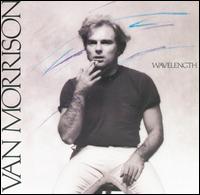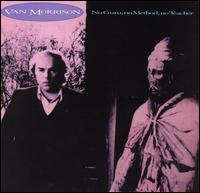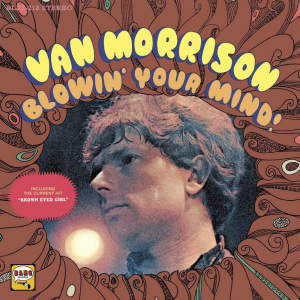
Astral Weeks is the second studio album by Northern Irish singer-songwriter Van Morrison. It was recorded at Century Sound Studios in New York during September and October 1968, and released in November of the same year by Warner Bros. Records.

Veedon Fleece is the eighth studio album by Northern Irish singer-songwriter Van Morrison, released in October 1974. Morrison recorded the album shortly after his divorce from wife Janet (Planet) Rigsbee. With his broken marriage in the past, Morrison visited Ireland on holiday for new inspiration, arriving on 20 October 1973. While there he wrote, in less than three weeks, the songs included on the album.

His Band and the Street Choir is the fourth studio album by Northern Irish singer-songwriter Van Morrison. It was released in November 1970 by Warner Bros. Records. Originally titled Virgo's Fool, Street Choir was renamed by Warner Bros. without Morrison's consent. Recording began in early 1970 with a demo session in a small church in Woodstock, New York. Morrison booked the A&R Studios on 46th Street in New York City in the second quarter of 1970 to produce two sessions of songs that were released on His Band and the Street Choir.

Wavelength is the tenth studio album by Northern Irish singer-songwriter Van Morrison, and was released in the autumn of 1978. The album has a different musical sound from his previous albums, leaning towards a pop rock sound with prominent electric guitars and synthesizers. Wavelength was Morrison's best selling album at the time of the original release. Mick Glossop, Bobby Tench and Peter Bardens were given credit for special assistance in production.

Inarticulate Speech of the Heart is the fourteenth studio album by Northern Irish singer-songwriter Van Morrison, released in 1983. Morrison said he arrived at the title from a Shavian saying: "that idea of communicating with as little articulation as possible, at the same time being emotionally articulate". As his last album for Warner Bros. Records, he decided to do an album which had more than the usual complement of instrumental tracks. As he explained in 1984, "Sometimes when I'm playing something, I'm just sort of humming along with it, and that's got a different vibration than an actual song. So the instrumentals just come from trying to get that form of expression, which is not the same as writing a song." Although not expanded upon, of note is that a special thanks is given to L. Ron Hubbard in the liner notes. The reissued and remastered version of the album contains alternative takes of "Cry for Home" and "Inarticulate Speech of the Heart No. 2".

No Guru, No Method, No Teacher is the sixteenth studio album by Northern Irish singer-songwriter Van Morrison, released in 1986 on Mercury.

Poetic Champions Compose is the seventeenth studio album by Northern Irish singer-songwriter Van Morrison, released in 1987 on Mercury Records. It received generally positive reviews from critics, most of whom viewed it as adequate mood music.

The eighteenth studio album Irish Heartbeat by Northern Irish singer-songwriter Van Morrison is a collaboration with the traditional Irish musical group the Chieftains, released in 1988. It was recorded at Windmill Lane Studios in Dublin, Ireland, and reached number 18 in the UK album charts.

Hymns to the Silence is the twenty-first studio album by Northern Irish singer-songwriter Van Morrison. It was his first studio double album. Morrison recorded the album in 1990 in Beckington at The Wool Hall Studios and in London at Townhouse and Westside Studios.

The Philosopher's Stone is a compilation album by Northern Irish singer-songwriter Van Morrison released in 1998.
"Into the Mystic" is a song written by Northern Irish singer-songwriter Van Morrison and featured on his 1970 album Moondance. It was also included on Morrison's 1974 live album, It's Too Late to Stop Now.

"Bright Side of the Road" is a song written by Northern Irish singer-songwriter Van Morrison and included on his 1979 album Into the Music. It was also one of the outtakes that made up the 1998 compilation album, The Philosopher's Stone. As a single "Bright Side of the Road" was released in September 1979 and charted at No. 48 in the Netherlands, No. 63 in the UK and just outside the Billboard Hot 100 in the US at No. 110. In 2020, the song reached its highest radio airplay chart position in Ireland, peaking at #2.
"Saint Dominic's Preview" is the title song of the sixth album by Northern Irish singer-songwriter Van Morrison, released in July 1972 by Warner Bros. It was recorded at the Wally Heider Studios in San Francisco in April 1972, with overdubs made later on. Morrison wrote it in a stream of consciousness in the same vein as some of his earlier works, particularly those on Astral Weeks. The song's narrative moves from France to San Francisco, Morrison's place of residence at the time, to Belfast, where he grew up, to New York City.
"Almost Independence Day" is the closing song on Northern Irish singer-songwriter Van Morrison's 1972 album Saint Dominic's Preview. The song is ten minutes long and features Morrison trading guitar licks with Ron Elliott.
"Listen to the Lion" is a song written by Northern Irish singer-songwriter Van Morrison and featured on his sixth album, Saint Dominic's Preview (1972). Its poetic musings and "bass-led shuffle" lead back to Astral Weeks territory.
"The Way Young Lovers Do" is a song by Northern Irish singer-songwriter Van Morrison from his second solo album, Astral Weeks. It was recorded in 1968, at Century Sound Studios New York City, during September and October of that year. The song is in triple metre. The distinctive feel of the original recording emerges from the non-rock style of double-bass phrasing by veteran jazzman Richard Davis and additional jazz musician session players, which combined with Morrison's soulful vocals, creates a relatively unusual combination of stylistic elements.

"Blue Money" is a song written by Northern Irish singer-songwriter Van Morrison. It was the second of two Top Forty hits from his 1970 album, His Band and the Street Choir, reaching No. 23 on the US chart. The US single featured "Sweet Thing", from the album Astral Weeks, as the B-side. It was released as a single in the UK in June 1971 with a different B-side, "Call Me Up in Dreamland". The song became Morrison's third best selling single of the 1970s, remaining on the charts for three months.
"I've Been Working" is a song written by Northern Irish singer-songwriter Van Morrison appearing on the album His Band and the Street Choir, released in 1970. The song was first an outtake from Morrison's well received album Astral Weeks of 1968. Other versions of "I've Been Working" were recorded for Morrison's next album Moondance, of which, three were released on the 2013 deluxe edition.

"The Eternal Kansas City" is a song by Northern Irish singer-songwriter Van Morrison. It was the key song on the 1977 album, A Period of Transition, and was his first single released since "Gloria", in 1974.

Blowin' Your Mind! is the debut studio album by Northern Irish musician Van Morrison, released in 1967. It was recorded 28–29 March 1967 and contained his first solo pop hit "Brown Eyed Girl". It was included by Rolling Stone as one of the 40 Essential Albums of 1967.













